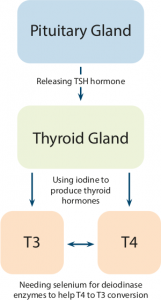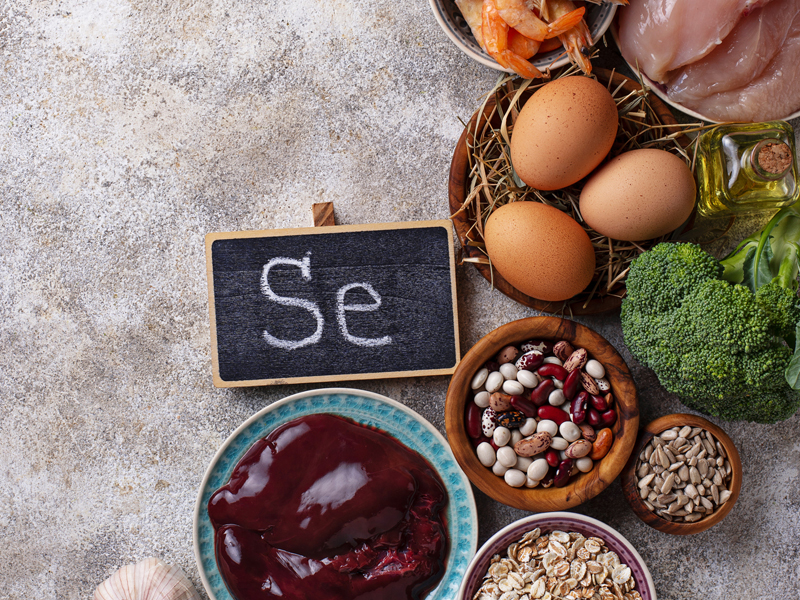Thyroid gland function. What is the role of Coenzyme Q10 and selenium supplementation in promoting good thyroid gland function? This is an important question because the thyroid gland produces the T3 and T4 hormones. These hormones play a decisive role in the regulation of several body functions: metabolism, energy expenditure, heart rate, body temperature, and body weight among them.

Prof. Jan Aaseth is the author of today’s review article. He is an endocrinologist and a member of the KiSel-10 study research team.
In a sub-study analysis, Professor Urban Alehagen and our KiSel-10 research team investigated the effect of combined CoQ10 and selenium supplementation of elderly Swedish citizens on thyroid hormones, cardiovascular mortality, and quality of life [Alehagen 2024].
Our analysis of blood samples from the KiSel-10 study has yielded the interesting results:
- At baseline before supplementation, study participants with the lowest serum selenium concentrations had low free T3 thyroid hormone levels and elevated TSH levels. Note: T3 is the active thyroid hormone that regulates metabolism and heart rate and other biological functions. TSH (thyroid stimulating hormone) is released by the pituitary gland and primes the thyroid gland to produce the T4 and T3 thyroid hormones. Elevated TSH levels correlate with low metabolism rates.
- Four years of daily combined CoQ10 and selenium supplementation was associated with a significant increase in the levels of the active hormone, the free T3, with a significant decrease in the levels of the precursor, the free T4, compared with the placebo treatment. Furthermore, the TSH levels were lower in the supplemented group.
- Study participants with lower TSH levels, compared to those with higher TSH levels, had significantly reduced cardiovascular mortality and had significantly improved measures of well-being and health-related quality of life.
Possible Explanations of the Effect on Thyroid Hormones
We, Professor Alehagen and the KiSel-10 research team, have suggested two possible explanations for the beneficial effect of the combined CoQ10 and selenium supplementation on thyroid hormones, cardiovascular mortality, and quality of life [Alehagen 2024].
- Individuals with low selenium status will most likely have lower deiodinase enzyme activity. The selenium-dependent iodothyronine deiodinases I, II, and III are central to the activation and deactivation of the thyroid hormones T4 and T3. Thus, deiodinase enzyme activity is vital to the conversion of inactive T4 to active T3. If there is less than optimal deiodinase activity, the subsequent sub-optimal regulation of the thyroid hormones has a negative impact on the metabolism of the heart muscle and on health-related quality of life [Alehagen 2024]. Thereby, sub-optimal selenium intake may cause a significant proportion of “healthy” community-living elderly to suffer from impaired thyroid function beyond the level of “sub-clinical hypothyroidism”. We need more research to test this hypothesis [Alehagen 2024].
- To some extent, the beneficial effect of the combined CoQ10 and selenium supplementation on the thyroid hormones and, by extension, on cardiovascular health and on well-being, may come from the role of Coenzyme Q10 and selenium in lowering oxidative stress and systemic inflammation. Our review of the published research literature about hypothyroid patients shows an association of the disease with low-grade systemic inflammation and increased oxidative stress. The research literature indicates a close relationship between selenium status and the level of inflammation and oxidative stress [Alehagen 2024]. And, we observed higher concentrations of C-reactive protein, the blood biomarker for inflammation, in the group with the lowest free T3 levels. We have seen in earlier KiSel-10 sub-studies that the combined CoQ10 and selenium supplementation is significantly associated with reduced circulating levels of biomarkers for oxidative stress and systemic inflammation [Alehagen 2022].
Combination of Coenzyme Q10 and Selenium

Otherwise healthy elderly people who do not get enough selenium from their food may suffer from sub-optimal thyroid function. Selenium supplementation may increase the activity of the deiodinase enzymes and may decrease inflammation.
The effects of the combined supplementation on the levels of the active thyroid hormone free T3 may explain the significantly improved well-being and quality of life reported by the study participants. Here, it is to be noted that the hormonal effects of the free T3 in various tissues depends on an adequate mitochondrial function, which is dependent on optimized levels of Coenzyme Q10 [Aaseth, Alexander, & Alehagen 2021].
Several mechanisms and anti-inflammatory mechanisms appear to be involved in our observations, and both traditional chronic systemic inflammation and autoimmunity appear to be reduced by the combined supplementation.
Chronic low-grade inflammation
Patients diagnosed with diseases with significant chronic, low-grade inflammation as a common factor respond well to CoQ10 supplementation. Supplemental intake of Coenzyme Q10 significantly decreases the production of inflammatory cytokines. CoQ10’s natural protection against disorders with oxidative stress and inflammation is a major contributing factor in the reduction of cardiovascular disease risk [Aaseth, Alexander, & Alehagen 2021].
In a 2023 meta-analysis of 31 randomized controlled trials enrolling 1517 study participants, Hou et al found that CoQ10 supplementation can significantly increase the concentration of circulating CoQ10 and can significantly reduce the circulating levels of C-reactive protein (C-RP) and other blood biomarkers for systemic inflammation [Hou 2023].
Schomburg has summarized observations on selenium status and thyroid disorders and inflammation as follows [Schomburg 2020]:
- The immune system does not receive high-priority supply of selenium in times of deficiency. Selenium supplementation of hypothyroidism patients may be beneficial because the supplementation enables the immune system to express the selenoproteins needed to respond to inflammatory challenges.
- Sub-optimal selenium intakes upset the optimal thyroid cell-lymphocyte interaction, especially when the thyroid gland is challenged. Selenium supplementation is, then, beneficial in reducing the level of circulating TPO autoantibodies and decreasing the extent of inflammation.
Autoimmune thyroiditis-generated inflammation
In patients with elevated thyroid peroxidase (TPO) levels, the interaction between the lymphocytes and the thyroid cells becomes disturbed. The produced TPO autoantibodies the mistakenly attack normal thyroid cells and tissue. Cytokines release results in inflammation and destruction of thyroid gland cells and tissue.
We did not test TPO levels in the KiSel-10 study blood samples. However, we know from other studies that selenium supplementation is associated with a significant lowering of TPO autoantibody levels [Wichman 2016].
Coenzyme Q10 and Selenium and Oxidative Stress
There is a special biological interrelationship between selenium and Coenzyme Q10. The cells are dependent on the sufficient levels of Coenzyme Q10 to achieve optimal function of selenium and selenoproteins. Moreover, a low intake of selenium can restrict the cells’ ability to obtain the optimal concentrations of Coenzyme Q10 [Alehagen & Aaseth 2015].
The selenium-dependent selenoproteins glutathione peroxidase and thioredoxin reductase are important antioxidants, protecting against oxidative stress. In its reduced form ubiquinol, Coenzyme Q10 is a lipid-soluble antioxidant that protects cell membranes and plasma lipoproteins against peroxidation. The selenium-dependent thioredoxin reductase enzymes act in concert with Coenzyme Q10 to supply the cells with the antioxidant form ubiquinol [Aaseth, Alexander, Alehagen 2021].
Conclusion: Importance of the Deiodinase Enzymes
In our sub-study, we demonstrated that the combined CoQ10 and selenium supplementation had beneficial effects on thyroid hormone activity. These benefits were reflected in significantly reduced cardiovascular mortality and in significantly improved health-related quality of life.
The supplementation with selenium appeared to restore deiodinase enzyme activity and thyroid hormone balance.
The combined daily supplementation with Coenzyme Q10 and selenium had clinical implications with respect to reduced inflammation, reduced oxidative stress, and reduced cardiovascular mortality.
Sources
Aaseth J, Alexander J, & Alehagen U. Coenzyme Q10 supplementation–In ageing and disease. Mechanisms of ageing and development. 2021;197: 111521.
Alehagen U, Alexander J, Aaseth JO, Larsson A, Opstad TB. Supplementation with selenium and coenzyme Q10 in an elderly Swedish population low in selenium — positive effects on thyroid hormones, cardiovascular mortality, and quality of life. BMC Med. 2024;22:191.
Alehagen U, Johansson P, Svensson E, Aaseth J, Alexander J. Improved cardiovascular health by supplementation with selenium and coenzyme Q10: applying structural equation modelling (SEM) to clinical outcomes and biomarkers to explore underlying mechanisms in a prospective randomized double-blind placebo-controlled intervention project in Sweden. Eur J Nutr. 2022 Sep;61(6):3135-3148.
Alehagen U & Aaseth J. Selenium and coenzyme Q10 interrelationship in
cardiovascular diseases – A clinician’s point of view. Journal of Trace Elements in Medicine and Biology. 2015;31:157-162.
Hou S, Tian Z, Zhao D, Liang Y, Dai S, Ji Q, Fan Z, Liu Z, Liu M, Yang Y. Efficacy and optimal dose of Coenzyme Q10 supplementation on inflammation-related biomarkers: A GRADE-assessed systematic review and updated meta-analysis of randomized controlled trials. Mol Nutr Food Res. 2023 Jul;67(13):e2200800.
Schomburg L. The other view: the trace element selenium as a micronutrient in thyroid disease, diabetes, and beyond. Hormones (Athens). 2020 Mar;19(1):15-24.
Wichman J, Winther KH, Bonnema SJ, Hegedüs L. Selenium supplementation significantly reduces thyroid autoantibody levels in patients with chronic autoimmune thyroiditis: a systematic review and meta-analysis. Thyroid. 2016 Dec;26(12):1681-1692.
The information presented in this review article is not intended as medical advice. It should not be used as such.



Leave A Comment